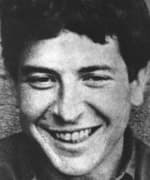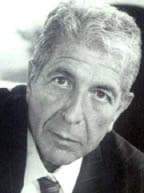Leonard Cohen
THE AUTHOR | BIBLIOGRAPHY

Born
1934
Died
2016
Publications
Poetry, novels, songs
Writing language
English
Literature
• Beautiful Losers (1966)
Novels
• Beautiful Losers (1966)
Poems
• "Hallelujah" (1984)
• "Anthem" (1992)
Poetry Collections
• Stranger Music: Selected Poems and Songs. (1993)
Canadian Literature
• Let Us Compare Mythologies (1956
• Beautiful Losers (1966)
• Stranger Music: Selected Poems and Songs. (1993)
A monk and a poet walk into a bar
For certain sensibilities, the music to play when seduction is on the menu is Leonard Cohen songs—any Leonard Cohen songs. They're seldom romantic in the style of the love songs in the Great American Songbook or modern pop traditions. But they have a quality of intimacy—at once melancholy and celebratory, reflective and flippant, mythologizing and demythologizing, like making love itself.
Think of his most famous song, "Hallelujah". The title is joyful and vaguely religious. The tune is meditatively worshipful like "Ave Maria". And the lyrics begin in the mythological vein, but they quickly take a different turn:
I've heard there was a secret chord
that David played to please the Lord,
but you don't really care for music, do you?
It goes like this, the fourth, the fifth
the minor fall, the major lift;
the baffled king composing Hallelujah!
The song continues in this typical Cohen fashioning of sacredness undercut by the profane. In the printed poetry version of "Hallelujah", the last added verse, seldom sung, is:
Maybe there's a God above
but all I've ever learned from love
is how to shoot at someone who outdrew you.
And it's no complaint you hear tonight,
and it's not some pilgrim who's seen the light—
it's a cold and it's a broken Hallelujah!
Hardly the affirming exaltation expected by lovers or worshippers. Startling really. Though it's written with such apparent sincerity—and seductiveness—that no one who hears or reads the words actually starts. Exhales perhaps.
The same holds for much of his non-musical poetry and prose (though, to be technical, there may be no such thing as non-musical writing, especially in Cohen's work). Like many another poet, Leonard Cohen sets about creating a mythology of himself in almost every piece but, like only a few other poets, he also sets about debunking his own mystery. Is it a supreme honesty, revealing himself so intensely? Or is it simply creating a new, deeper layer of myth?
At times in his writing, Cohen seems to fess up to the latter interpretation. In any case, in his best work we're mesmerized by the performance. He may be self-involved, like many writers or songwriters, but he's mastered the art of making us feel what he finds in himself is important to us.
(For the most part. For all his successes, some of his poems, especially the very short ones of his middle to late period, remain impenetrable to me, like clever little fragments of a personal mythology that he threw on the page before he could build them into something more meaningful. But they're easy to skip on the way to the more polished works.)
And the humour. Those who gripe his writing is unrelievedly dark (usually accompanying the complaint his music is boring and dirge-like) should try reading Cohen's poems and lyrics for their satirical and fanciful elements. Joyfulness even. He has an incredible light touch that eludes most modern poets. Which may explain why some other modern poets and academic critics seem to consider him lightweight.
I'm your con man
In the 1960s Leonard Cohen was just about the coolest literary figure around. A young poet who lived the Bohemian lifestyle associated with the poets of popular fiction, who spoke like a man of profound mysteries, who wrote both hopefully and cynically of love and of the mystical in the mundane. And a folksinger to boot. You know how people were always saying Bob Dylan was the poet of pop music? Well, Leonard Cohen was a singer-songwriter in the same class who really was a poet.
His writing managed to be both critically acclaimed and accessible to the public, especially to the romantic young who took it to their hearts.
The really strange thing is that as he grew older, appearing as a gaunt grey-haired gentleman in stylish suits and fedoras, writing both more cynically and more affirmatively and with more conventional religiosity, he retained his image as one very cool dude.
He became a Canadian literary icon, although his reputation as a poet and as a songwriter is vast and international. Perhaps "icon" is the wrong word, for Cohen was not so much a representative of a Canadian sensibility as it was a living mythology in that country. No one's ever been quite sure what he was: poet, performer, novelist, philosopher, satyr, monk, con artist....
We're never certain he hadn't been putting us on, that his works have not been just a private language he occasionally makes public to tease us. Yet we continue to hum his songs and quote his poems as if they mean something to us.
Cohen was born in Montreal to a wealthy Westmount family, but divided his life among that city, Greece, Nashville and Los Angeles, where he is associated with a Zen Buddhist community.
While a student at McGill University he formed a country-western trio and started writing poetry. He was still an undergraduate when his first book of poems, Let Us Compare Mythologies (1956) was published. The mix of hushed sacred tones and offhand vulgarity, expressed with occasionally breathtakingly beautiful imagery and sly humour drew local attention. Only 400 copies of Let Us Compare Mythologies were printed in 1956, although it was reprinted several times in the following decade as Cohen became famous.
It was his second collection, The Spice Box of Earth (1961), that won him international recognition, particularly after it was published in the United States a few years later. This book continued in the alluringly confessional vein of the first, although to slightly lesser effect in my opinion, and also introduced a concern with Jewish traditions.
After attending Columbia University in New York briefly, Cohen travelled in Europe and settled on the Greek island of Hydra where he stayed on and off for seven years. His next collection of poetry, Flowers For Hitler (1964), was controversial, as the title might predict, and was followed by Parasites of Heaven (1966). All these early books of poetry are difficult to find now, as the most popular poems have been republished in selected and collected works.
However in this period he also produced two novels, The Favorite Game (1963) and Beautiful Losers (1966), which were applauded by critics and have continued to be popular sellers over the years despite (or perhaps because of) their experimental styles and crude sexuality. Beautiful Losers, a densely scatological work in the stream-of-consciousness vein, is considered by some to be his masterpiece.
But instead of sticking with his highly successful novel-writing, Cohen switched to songsmithing, releasing the album Songs of Leonard Cohen in 1967 which made him somewhat of a folk-pop star with such sadly sung compositions as "Suzanne," "Sisters of Mercy" and "So Long, Marianne." He also continued producing poetry, his Selected Poems (1968) winning the Governor-General's Award, Canada's highest literary honour, which he turned down.
By 1972, however, he seemed out of poetic ideas with the publication of The Energy of Slaves, a seemingly meandering mess of whatever trivial thoughts happened to pass through his head when he put pen to paper. One of the repeated themes of this book is his acknowledgment that he's washed up as a poet. Nonetheless he continued to put out new collections every few years, including Death of a Lady's Man (1978), which was also released as a song album, and Book of Mercy (1984), which presents psalms in prose form. Altogether over these latter years he's had a diverse output ranging from "anti-poem" cynicism to rich, religion-tinged lyricism.
New musical albums have also continued to be released over the years, including such classic songs as "Bird on a Wire", "Ain't No Cure for Love", "First We Take Manhattan", "I'm Your Man", "Closing Time", "The Tower of Song", and "Hallelujah"—many also published as poems—cementing his position as one of the world's most important songwriters.
Cool, not cooling
In 1993 the two careers came together formally with the publication of Stranger Music: Selected Poems and Songs. The interesting thing about that collection is how comfortably his selected song lyrics sat among the straight poems. Dylan, who was a friend and songwriting rival, was later given the Nobel Prize for literature, but Cohen was the one who more successfully merged music and literature. The closest example of this fusion I can find in the past is in the inextricably commingled songs and poems of Robert Burns.
The comparison with Burns, by the way, can be taken further. A song/poem like Cohen's "Closing Time" creates a joyful scene in a bar as common people drink and celebrate escape from daily life, like a hundred song/poems of the Scottish bard. That's just one, perhaps atypical, example, but both poets had the ability to seamlessly blend the profound with the every-day mundane in a popular style.
In the year Stranger Music was published, Cohen was awarded the Governor General's Performing Arts Award. This time he accepted.
Since then he went into monastic reclusion for five years, suffered bankruptcy, sued and was sued, went on a highly successful world concert tour, published best-selling books of new poems and drawings, released hit albums, and saw his songs rise up the charts, including a time when three versions of "Hallelujah" were on the British top forty, including the number one and two spots. How cool was that for a guy in his seventies.
And his reputation seems to have only grown following his death in his early eighties. Seductive to the end.
— Eric
THE AUTHOR | BIBLIOGRAPHY




